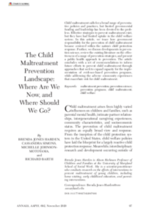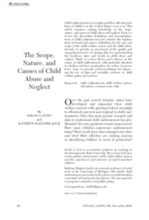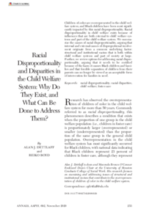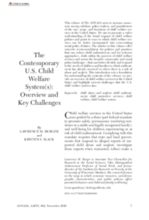This page contains documents and other resources related to children's care in the Americas. Browse resources by region, country, or category.
Displaying 561 - 570 of 3191
This article from the Washington Post tells the stories of families who were separated at the U.S. border with Mexico due to the U.S. "zero tolerance policy," then reunited, and then separated again by Immigration and Customs Enforcement.
"A disturbing trend has led to a plea from doctors across [Canada] as more babies and children are being treated with serious trauma, fractures and in some cases, malnutrition," says this article from Global News.
In this article, the authors trace how government responsibility for the prevention of child maltreatment became centered within the U.S. child protection response.
This article examines existing knowledge on the scope, nature, and causes of child abuse and neglect in the U.S.
This article summarizes the causes of racial disproportionality, arguing that internal and external causes of disproportional involvement originate from a common underlying factor: structural and institutional racism that is both within child welfare systems and part of society at large.
This introduction sets a foundation for understanding the contents of this volume of The ANNALS, which aims to increase awareness among scholars, policy-makers, and practitioners of the size, scope, and functions of child welfare services in the United States.
This article provides an overview of the funding streams that finance the U.S. child welfare system, reviews the federal legislation since 1970 that has led to the current funding structure, and ends with a discussion of how the Family First Prevention Services Act of 2018 has the potential to create better outcomes for children and families by promoting prevention activities and program support with strong evidence of success.
This article considers how U.S. child welfare agencies can best leverage the opportunities presented by the Family First Prevention Services Act of 2018 while addressing potential barriers posed by the paucity of evidence-supported prevention programs and avoiding the unintended consequences of limiting reimbursement to only selective prevention services that meet rigorous evidence standards of effectiveness.
The author of this article analyzes young people’s experiences in foster care from a life course perspective, accounting for when foster care happens, how long it lasts, and what happens when foster care placements end.
"The [U.S.] Trump administration separated far more children — the latest total stands at more than 5,500 — starting much earlier than it initially acknowledged," says this piece from NPR. "And more than 1,400 parents were ultimately deported without their children, according to immigrant advocates." The former administration had refused to allow parents who'd been deported back into the U.S. to reunite with their children. "Now all eyes are on Biden."





